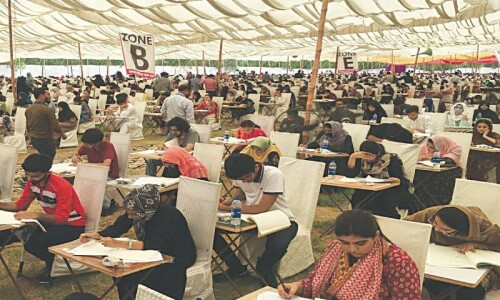KARACHI, Nov 20: Speakers at the three-day regional consultation on “Workers as citizens: markets and rights in South Asia” urged the South Asian states to open up their borders for workers from the region and treat them equal to their own workers.
The event was organised by the Pakistan Institute of Labour Education and Research (PILER) and South Asia Alliance for Poverty Eradication.
Delegates from Bangladesh, Nepal, Sri Lanka and India, besides a large number of local trade union leaders and representatives of civil society organisations, are participating in the conference. The subjects discussed on Thursday, the second day of deliberations, were “Labour without borders: aspirations and realities in South Asia” and “Collective action”.
Most speakers said it was a fundamental right of a person to move from one place to the other in search of a better livelihood.
A trade union activist from India, Ashok Gosh, said the ground reality was that when workers tried to exercise this basic right, they were victimised, prosecuted and treated inhumanly. Citing an example of South Eastern workers, particularly those employed in the Middle East states, he said that in many of these countries workers were treated badly and their documents were confiscated on arrival in the host country. The workers were treated as slaves, he observed.
Another Indian delegate, N. P. Samy of the Bangalore-based National Centre for Labour, also stated that although some South Asian countries demanded due rights for their workers from the Middle East states and western countries, they themselves treated workers from their own region very badly. He observed that Nepali workers in India, Bangladeshis in Pakistan and Bhutanese in Nepal were maltreated and their rights usurped. Unfortunately, he added, even trade unions of these countries did not recognise migrants as equal workers.
A trade union activist from Nepal, Hari Datta Joshi, said that while an estimated 200 million workers were on the move within the South Asian region without enjoying their due rights, many of the South Asian countries unfortunately had not even ratified the International Labour Organisation’s convention on migrant workers. He said that the South Asian workers did not migrate just to look around but due to compelling situation, poverty being the major factor forcing the South Asian workers to migrate as their own states had failed to ensure means of mere survival.
A representative of the Tea Plantation Workers Association of Sri Lanka, A. Muthulingam, lashed out at the process of globalisation which, according to him, had benefited only the capitalists. Under this system, he said, capital could move to any region but when it came to workers, there were many restrictions. He said that poor workers were the worst victims.
Highlighting plight of the fishermen in Pakistan and India, Saeed Baloch said the poor fishermen were taken into custody while fishing in the waters shared by the two countries. They were accused of violating the sea borders, he said, adding that 43 Pakistani fishermen were at present languishing in Indian jails while 364 Indian fishermen were locked up in Pakistani jails. He said that fishermen were ordinary workers and did not have the gadgets or compass that could guide them about the sea borders. Hence they sometimes unknowingly cross the invisible border. They were sent to jails and kept there for years, he said.
The participants urged the regional states to immediately lift the ban on workers’ movement and simplify the procedure for their movement. Keeping in view the potential in the region, they said, if workers were allowed to move freely and work in a country of their choice within the region, there could be no need for them to look for some other destinations.
A Nepalese delegate, Dr Sarba Raj, termed the neo-liberal economy “anti-worker”, and said that the concept of free market had made it difficult for workers to take collective action. He said that the percentage of unionised staff in South Asia was between 3 and 5, except in Sri Lanka where it was around 20 per cent.
M. R. Shah from Sri Lanka said that in a situation where over 70 per cent of the economy comprised the informal sector, collective action of workers was very difficult, though it was the only way forward.
Dr Wajeed-ul-Islam from Bangladesh said that whether it was the formal or informal sector, the only way to fight the monster of globalisation was collective action.
A senior trade union leader, Dr Tanveer Gondal, said that the present financial crisis was the failure of global capital market but the United States was not ready to accept this and was rather bent upon victimizing workers in the developing countries. He observed that the global financial crisis was now resulting in downsizing and privatisation in the Third World countries, and the situation was so grim that even survival of the common man was at stake.
Labour leaders Fareed Awan and Altaf Baloch were among the others who spoke at the meeting, conducted by Zulfiqar Shah.













































Dear visitor, the comments section is undergoing an overhaul and will return soon.